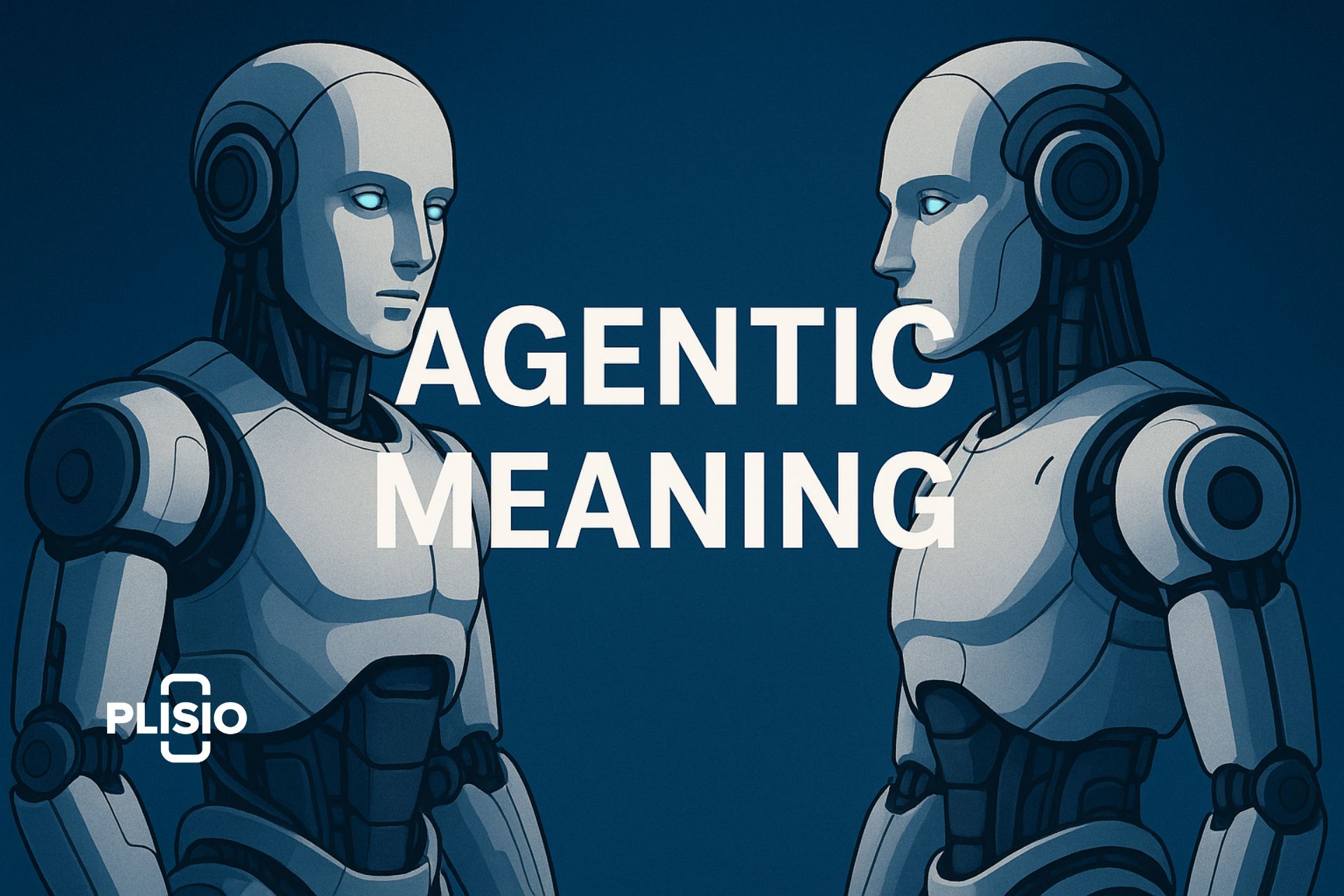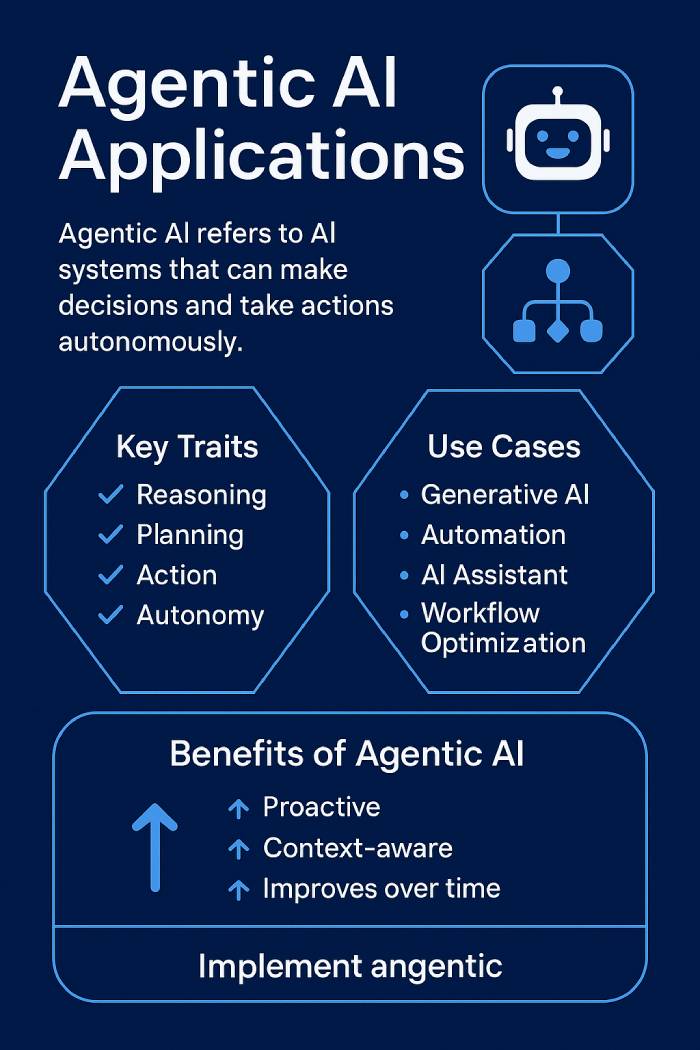What Does Agentic Mean?

In recent months, the phrase agentic AI has become a hot topic. Searches for the term have skyrocketed, reflecting growing interest in a new form of artificial intelligence that doesn’t just sit idle, but can make decisions, act autonomously, and continuously optimize workflows.
The rise of agentic AI is tied to a shift in how people imagine AI systems: not as reactive tools, but as proactive and autonomous partners. Yet the word agentic itself has been around for decades in psychology and education, describing the way humans take ownership of their learning and decision-making. Now, the same idea is being applied to AI models and agentic systems.
Agentic AI: What Does It Mean?
To be agentic is to have the power of agency — the ability to achieve outcomes independently and take actions without constant human oversight.
For example, think of an AI assistant in IT that doesn’t just answer questions, but autonomously monitors systems, executes fixes for small issues, and escalates major problems in real-time. This isn’t traditional AI responding passively to commands; this is agentic AI in action.
Today, the term most often appears in phrases like agentic AI system or autonomous AI agents, but its essence remains the same: autonomy, proactive problem-solving, and decision-making.
Agentic AI in Education: Implementing Agentic Learning
In education, the concept appears as agentic learning or agentic engagement. Here, students are encouraged to take initiative, contribute actively, and use autonomy in shaping their own paths. Instead of just completing assigned exercises, a student who uses generative AI as a tool to build an app outside of class is showing agentic behavior — going beyond instructions in natural language and taking charge of their education.
Agentic AI in Psychology: Real-World Perspectives
In psychology, agentic state theory by Stanley Milgram shows the opposite: how humans sometimes give up agency and allow authority figures to make decisions for them. His experiments revealed that people could enter an agentic state, transferring responsibility for their actions to others. This tension between autonomy and compliance is part of why the term agentic carries so much weight when applied to AI systems today.

Agentic AI in Business: AI Applications and Adoption
Agentic AI refers to AI systems that operate autonomously to pursue complex tasks, reason strategically, and adapt to changing conditions. These AI applications go beyond traditional AI or standard automation by incorporating LLMs (large language models), natural language processing, and machine learning to make decisions and act proactively.
Picture an HR AI assistant that doesn’t just schedule interviews but also evaluates resumes, ranks candidates, and updates hiring workflows in real-time. This shows how agentic AI acts as an autonomous partner within business operations.
2025 adoption data illustrates the rise of agentic AI: The market for agentic systems is valued at around USD 7.5 billion in 2025, with projections soaring past USD 199 billion by 2034 at a CAGR over 43%. While nearly 79% of companies use AI agents, only 34% are implementing agentic AI systems today, and just 14% have fully deployed them. Still, those that use agentic AI report 32% average cost savings and measurable boosts in productivity.
Agentic AI vs. Machine Learning
Machine learning enables AI models to improve over time by recognizing patterns in data and making predictions. But ML alone doesn’t execute or take actions. It lacks autonomy.
Agentic AI, by contrast, integrates ML with agentic behavior, enabling systems to autonomously set goals, handle complex workflows, and adapt to changing environments without human intervention. An AI help desk that anticipates common issues, resolves them proactively, and improves from each interaction is an example of agentic AI in real-world use cases.
In short, machine learning improves predictions, while agentic AI offers proactive, autonomous decision-making and action.
How Agentic AI Works
Agentic AI operates through three enabling AI technologies:
- Large language models (LLMs): Provide language understanding and generative AI capabilities to interact naturally with humans.
- Natural language processing (NLP): Helps AI interpret instructions in natural language, enabling AI agents to gather context and intent.
- Machine learning (ML): Allows agentic AI systems to improve over time, learn from real-world data, and optimize their workflows.
With these components, agentic AI can autonomously reason, plan, execute, and adapt to changing conditions.
Benefits of Agentic AI: Key Features
- Autonomous actions – AI systems can act without direct human intervention, showing autonomy and independence.
- Goal-setting – Agentic AI can set objectives, unlike traditional AI, which simply reacts.
- Adaptive learning – Agentic AI continuously adapts to changing inputs and feedback.
- Reasoning and planning – Unlike traditional AI models, agentic AI systems can handle complex tasks and make decisions across multi-step workflows.
- Proactive problem-solving – Instead of waiting for errors to escalate, agentic AI continuously monitors, identifies, and solves issues.
Agentic AI vs. AI Agents: Understanding the Difference
AI agents operate as standalone entities — think chatbots, self-driving cars, or recommendation systems. They gather data, make limited decisions, and execute tasks. But when multiple AI agents operate together inside an agentic AI system, the power of agentic workflows grows exponentially.
For instance, a chatbot alone is just an AI application. But incorporated into an agentic system, the same chatbot autonomously identifies customer needs, provides contextual solutions, and even escalates issues to humans when necessary.
The Future of Agentic AI in Automation
Automation has long focused on static rules and scripts. Agentic AI goes beyond, offering autonomy, adaptability, and proactive AI actions that continuously optimize workflows. Unlike traditional AI tools, agentic AI operates with real-time feedback loops, improving agentic workflows without extensive coding.
Benefits of agentic AI in automation include:
- Continuous self-improvement through LLMS and real-world feedback.
- Greater versatility in automating complex autonomous AI tasks across business functions.
- Better usability, as agentic AI uses natural language to interact with humans and AI applications.
Organizations that incorporate agentic AI into their systems report higher productivity, reduced costs, and more flexible operations. With AI adoption accelerating and companies seeking to deploy next-generation AI solutions, the future of agentic AI promises to reshape industries, automate complex workflows, and extend the autonomy of AI agents.
In essence, agentic AI refers to AI systems designed to act autonomously, make decisions, and continuously improve. By blending large language, generative AI, machine learning, and NLP, agentic AI could deliver the future of automation — one where AI acts as a partner, not just a tool.

